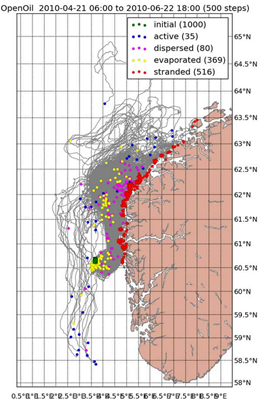 A new, open source software for modeling the trajectories and fate of particles (Lagrangian Elements) drifting in the ocean, or even in the atmosphere, has been developed a the Norwegian Meteorological Institute in cooperation with the Institute of Marine Research. The software, known as OpenDrift, is a generic framework written in Python. It is openly available at https://github.com/knutfrode/opendrift/.
A new, open source software for modeling the trajectories and fate of particles (Lagrangian Elements) drifting in the ocean, or even in the atmosphere, has been developed a the Norwegian Meteorological Institute in cooperation with the Institute of Marine Research. The software, known as OpenDrift, is a generic framework written in Python. It is openly available at https://github.com/knutfrode/opendrift/.
The development of OpenDrift has been supported, in part, by the Deep-C Consortium — a long-term, interdisciplinary study investigating the environmental consequences of petroleum hydrocarbon release in the deep Gulf of Mexico on living marine resources and ecosystem health. Deep-C focuses on the geomorphologic, hydrologic, and biogeochemical settings that influence the distribution and fate of the oil and dispersants released during the Deepwater Horizon accident, and is using the resulting data for model studies that support improved responses to possible future incidents. This research was made possible in part by a grant from the Gulf of Mexico Research Initiative (GoMRI) to the Deep-C Consortium.
